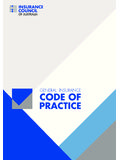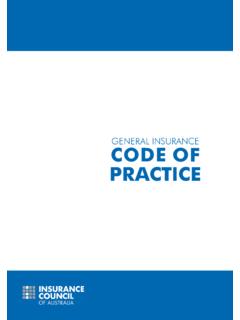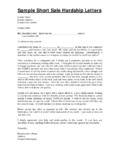Transcription of Financial hardship obligations – General Insurance Code of ...
1 Guidance note no. 1 Financial hardship obligations General Insurance Code of Practice Section 8 of the General Insurance Code of Practice: obligations for Code subscribers to assist consumers in Financial hardship , including insureds, third-party beneficiaries and uninsured third parties. This Guidance Note sets out the General Insurance Code Governance Committee s (CGC) expectations of Code subscribers to ensure: the timely assessment of requests for hardship assistance communication with a consumer s authorised representative access to internal complaints processes, and compliance by your employees and service suppliers. Guidance note Complying with the Financial hardship obligations in the General Insurance Code of Practice, Version 1, March 2018 1 Timely assessment of hardship assistance needs When a consumer requests Financial hardship assistance, you should respond quickly and appropriately.
2 This means that you should: understand the consumer s Financial difficulties and their impact as soon as possible, identify and ask for any additional information you need to assess the consumer s application only request information that is genuinely necessary ensure that any request for information does not unreasonably or unnecessarily delay your assessment of the hardship request. The Code does not specify a timeframe for assessing a hardship request. However, based on the requirements in the National Credit Code, the CGC recommends the following timeframes for hardship application assessment and notification: CIRCUMSTANCE ACTION AND TIMEFRAME You receive notice of the consumer s hardship : Within 21 calendar days, assess the request for Financial hardship assistance and either: inform the consumer of your decision in writing, or request any additional information needed.
3 You have requested additional information: Allow at least 21 calendar days for the consumer to provide the information. You receive the additional information: Within 21 calendar days, assess the application and inform the consumer of your decision in writing. You do not receive the additional information: Within 28 calendar days of your request for additional information, assess the application on the information available and inform the consumer of your decision in writing. Guidance note Complying with the Financial hardship obligations in the General Insurance Code of Practice, Version 1, March 2018 2 Communication with authorised representative Many consumers in Financial hardship have an authorised representative, such as a Financial counsellor, who is involved in managing the consumer s hardship case with you.
4 In some cases of this type the consumer may independently contact you about their hardship matter. If this occurs, you should notify the consumer s authorised representative of the contact and what was discussed. This ensures that the authorised representative is aware of relevant matters and best able to assist consumers who are vulnerable. Access to internal complaints processes for uninsured third parties in Financial hardship Both customers and uninsured third parties in Financial hardship have the right to make a complaint to you in relation to matters covered by section 8 of the Code. You must handle such complaints via an internal complaints process that meets the standards set out in section 10 of the Code. This is a critical right and one that the Insurance Council of Australia (ICA) has clearly stated extends to uninsured third parties.
5 See information about the availability of the internal complaints process under Financial hardship at Employees and Service Suppliers should recognise when consumers are in Financial hardship and comply with standards You have a responsibility to ensure that Employees, Collection Agents and other Service Suppliers involved in the recovery of money owed to you: understand, and know they must comply with, the Code s Financial hardship standards are trained to recognise when someone is in Financial hardship , and are capable of making reasonable enquiries about a consumer s Financial hardship . Guidance note Complying with the Financial hardship obligations in the General Insurance Code of Practice, Version 1, March 2018 3 About the General Insurance Code Governance Committee (CGC) The General Insurance Code of Practice is a voluntary industry code that promotes high standards of service and better customer relationships in the General Insurance industry.
6 The CGC is the independent body responsible for monitoring and enforcing Code Subscribers' compliance with Code standards. Guidance notes This Guidance note is issued as part of the CGC s functions under its Charter, which authorises the CGC to provide Code Subscribers and other interested persons with guidance on compliance with the Code (section (l)). Guidance notes are subject to change and reflect the CGC s views at the date of publication. The CGC considers all matters individually and this document does not anticipate all possible issues that might come before it.







